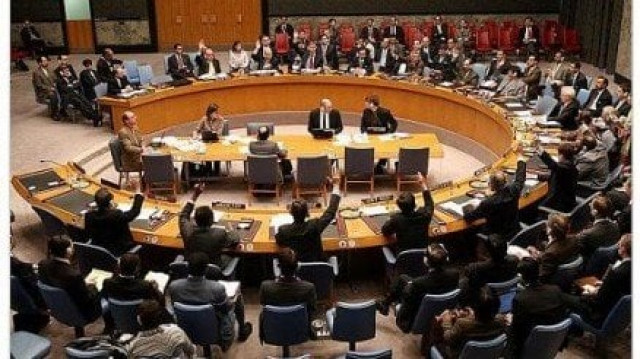Pakistan calls for OIC, Arab League to be represented in UNSC
Pakistan made a strong case for the representation of regional organisations, such as the OIC and Arab League in the UNSC.

The United Nations Security Council. PHOTO: FILE
"In line with the new realities, it is important to increase interaction with and to embed the role of the regional organisations in a Security Council of the future," Ambassador Abdullah Hussain Haroon told a closed-door session of the General Assembly on expanding the most powerful UN body aimed at making it more representative and more effective.
Full-scale negotiations to restructure the council began in the General Assembly in February last year on five key areas - the categories of membership, the question of veto, regional representation, size of an enlarged Security Council, and working methods of the council and its relationship with the 192-member assembly.
Speaking on regional representation, the Pakistan ambassador backed the African Union's representation in view of the group's contribution to peace and security in the continent. Similarly, ambassador Haroon said many major issues on the council's agenda relate to the Islamic world. "The OIC and the Arab League thus have vital interests in the reform, and have clear demands for representation in an enlarged Council," he said. "While these two are cross-regional groupings, their representation can be accommodated through arrangements between Asia and Africa. A precedent already exists for Arab representation alternating between Africa and Asia."
But ambassador Haroon emphasised that expansion must address the under-represented regions vis-a-vis those that are over-represented. "Our position ensures greater allocation of seats in the first place to Africa and Asia (the two largest regions), Latin America as well as the small States and the developing countries," he added.
Despite the general agreement on enlarging the council, as part of the UN reform process, member states remain sharply divided over the details. In July 2005, the so-called Group of Four India, Germany, Japan and Brazil made a bid for permanent seats without veto rights on a 25-member council, with six new permanent seats without veto power, including two for the African region, and four additional non-permanent seats.
In the same year, the Italy/Pakistan-led "Uniting for Consensus" (UfC) group opposed any expansion of the permanent members on the Security Council. It sought enlargement of the council to 25 seats, with 10 new non-permanent members who would be elected for two-year terms, with the possibility of immediate re-election.
In April 2009, Pakistan also backed a proposal, tabled by Italy and Columbia, which would create a new category of members - not permanent members - with three to five years duration and a possibility to get re-elected. It envisages the Security Council's enlargement by 10 seats to make it a 25-member body. On its part, the African Union's has called for the Council to be enlarged to 26 seats, one more permanent seat than the G-4 proposal. Its proposal for six new permanent seats was the same as the G-4's, except that it would give the new members veto power.



















COMMENTS
Comments are moderated and generally will be posted if they are on-topic and not abusive.
For more information, please see our Comments FAQ